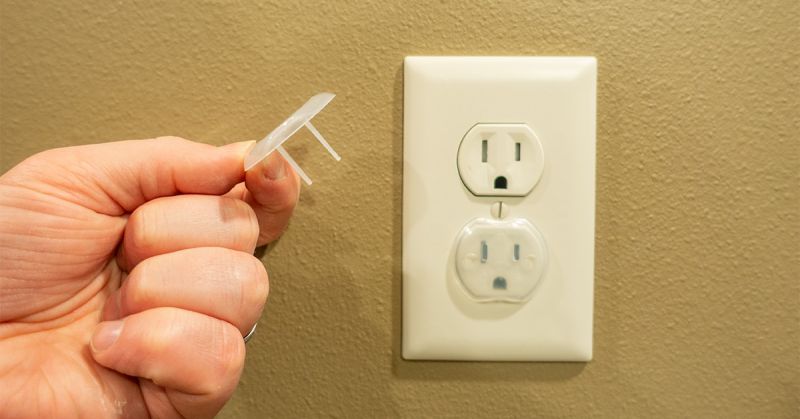
Electrical Safety for Children—A Primer from Your Trusted Tallahassee Electricians
Electricity is all around you in your Tallahassee-area home, but—“out of sight, out of mind”—you probably rarely think about it as it powers your lights, appliances, and numerous other modern conveniences. Your home’s electricity may be nebulous, but it’s a powerful force that deserves respect and care. According to a recent National Institute of Health Study, electrical injuries in the U.S. cause approximately 1,000 deaths and 30,000 injuries annually, with 20% of these injuries affecting children.
While most adult electrical injuries occur in the workplace, children tend to suffer electrical injuries in the home. With that in mind, Tallahassee’s Meeks Electrical Services thought it might be a good idea to provide a primer on electrical safety for children. While kids aren’t likely to read this blog, you can pass on what you learn to your children to enhance their electrical safety smarts.
It’s Never Too Early to Teach Kids About Electrical Dangers
You should start teaching your children electrical safety when they begin to talk and comprehend language. Using simple terms, you can emphasize how outlets, chords, and electrical appliances, tools, and gadgets are inherently dangerous due to the electricity that powers them. This message should be repeated frequently and whenever the opportunity presents itself. For example, during bath time, make sure you let them know that electric-powered gadgets, like hair dryers or radios, should never be in a position where they might fall into the tub. Or, when you plug a device or appliance into an outlet, explain why nothing but a plug should ever be inserted into it.
Young children naturally fear thunder and lightning, so explain the phenomenon and let them know their apprehension is warranted. Teach them to seek cover indoors when a storm approaches and explain why trees are not good cover because their height might attract a lightning strike. If you have a swimming pool, make sure you get them out of it at the first sign of a thunderstorm and explain why.
Electrical Safety Within the Home
If you have toddlers in the home, there are several precautions you should take. Outlets should be child-proofed, with tamper-resistant receptacles or plug caps. If you have two-prong outlets in the house, now is an excellent time to replace them with safer, grounded three-prong ones. Keep your cords and wires orderly and tucked away to ensure they will not be a tripping hazard. Additionally, exposed cords and wiring increase the risk of getting shocked. Speaking of which, if you have older lighting and electrical equipment, you should check the cords for wear and damage that might present a shock risk.
No matter what your children’s age, to avoid the risk of shock from indoor electrical components, you should continuously emphasize these electrical safety rules:
- No chewing or playing with electrical cords or wires.
- Never touch exposed wiring.
- Nothing gets inserted into electrical outlets but plugs.
- Never plug too many electronics into the same power strip or extension cord.
- When unplugging a cord, always hold it by the base of the plug and never pull on the cord.
- Unplug appliances before cleaning them.
- Unplug the toaster before trying to free a jammed piece of toast.
- Avoid operating or touching anything electronic while wet.
- Don’t use wired electronic equipment near bathtubs, sinks, showers, or other water sources.
- If any of the home’s electrical features are not working, inform your parents or another adult.
- Ask an adult before using new electronics.
- Inform parents or another adult if you smell something burning.
Electrical Safety in the Great Outdoors
There are far fewer electrical hazards outside and we’ve already covered thunderstorms and swimming pools. However, we will further emphasize that water and electricity do not mix, so make sure your children are fully informed about the danger of using wired electrical devices or equipment near the swimming pool or in the presence of any water, such as in a saturated yard.
Children should be taught that any outdoor electrical components, including power lines, utility poles, transmission towers, wiring boxes, outdoor wiring, and outlets, represent a hazard. Teach your children always to be aware of the powerlines above them lining the street and traversing the yard. They should learn to check for power lines before climbing a tree and never climb one that is touching one. They need to know that kites, drones, and model airplanes should always be flown in open areas free from power lines. And, when they get old enough for serious yard work around the house, teach them to check for the power lines before extending a ladder.
Resources to Help Further Educate Your Children
To further educate your children about the hazards of electricity around the home, you can show them these videos:
Or these online games:
Contact Meeks for All of Your Tallahassee-Area Electrical Needs
Electrical hazards around the home are not always obvious, especially if you live in an older home. If you have concerns about your home’s electrical safety, contact the residential technicians at Tallahassee’s Meeks Electrical Services for a home inspection and electrical upgrades. For all residential and business electrical needs in the Tallahassee area, contact Meeks today at (850) 575-3201.